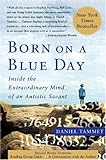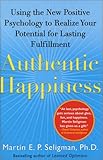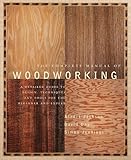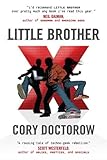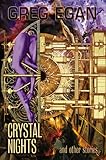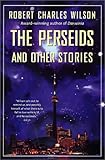I like to read.
Here are the best books I read this year.
Nonfiction
Born On A Blue Day & Embracing the Wide Sky by Daniel Tammet
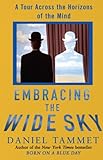
Yes, it’s two books, but it’s really about the same subject. Daniel Tammet is an autistic gay savant synesthete. He won the unusualness lottery. The first book is his life story and the second is a tour through what he’s learned about the human mind. An amazing amount of good neuro and cognitive science in here, presented in a clear, non-technical way. You can read more about it in my earlier review.
Nonzero: The Logic of Human Destiny by Robert Wright
It’s brilliant. Like Guns, Germs, and Steel, examines all of human history through a single lens, in this case win-win games.
The thesis is that human life and all progress comes about as a series of non-zero sum interactions, games where both parties win.
It gets a bit repetitive some times – when a story begins you can start predicting how it will end because there is only one theme in the book, but it effectively demonstrates the idea and shows you the impact throughout history and applications for the future
Authentic Happiness : Using the New Positive Psychology to Realize Your Potential for Lasting Fulfillment by Martin Seligman
When I was a kid, my answer to “whaddya wanna be when you grow up” was always “Happy.” 1 I had noticed how often adults didn’t seem to be happy and how often they weren’t doing anything about it. Seligman is no snake-oil guru, he’s a past president of the APA and an experimental psychologist who worked on some of the great experiments of the 20th century. His explanations of happiness are based on actual study and experimentation and the recipes for success seem to match up with my personal experience. While I haven’t read his book on Learned Optimism, I’ve heard similar praise for it.
Opening Skinner’s Box: Great Psychological Experiments of the Twentieth Century by Lauren Slater
Pure poetry. Laura uses the structure of foundational experiments in social psychology to raise deep questions about medicine, free will, obedience, and the ethics of experiments that involve conscious beings.
I’ve reconsidered long held ideas because of this book. I cannot recommend it highly enough for people who are unfamiliar with how brains work but don’t want to wade through the dry details. Where Daniel Tammet is explaining the big picture, Laura is giving you the impact of these experiments.
If Mary Roach wrote about psychology, but actually had something to say, she might write this book.
Worth reading just to learn what happened to the subjects after the Milgrim experiments in obedience to authority.
The Complete Manual of Woodworking by Albert Jackson
I’m just a beginning woodworker, but this is a great resource.
It’s full of huge, gorgeous shots of wood, cuts, examples and tools. It covers the wide range of methods and materials with great detail but remains accessible.
Reading this book is also worth it for someone uninterested in actually doing any woodworking. It shows you how the furniture and tools around you are made, how the character of wood shapes the architecture of the things around you. I certainly look at my kitchen cabinets with new eyes. You’ll find out why in this book.
Fiction
Litttle Brother by Cory Doctorow
Loved this.
Sent it to my dad. Recommending it to everyone. It’s about how smart courageous kids deal with adults giving up on freedom after a terror attack.
Well written, fast paced, and filled with real characters – something the SF genre doesn’t always get. This isn’t far future fiction, this is about right now.
The technology is all homemade and usable. Heck, they even have DIY instructions for elements of Little Brother up on instructables. Doctorow is a smart thinker about the problems of security, terrorism and politics. He’s an editor on the wonderful BoingBoing blog and is kind enough to provide you free electronic copies of Little Brother under a Creative Commons BY-NC-SA license. That means you can give it away and make new things with it, but you’ve gotta make those shareable, give Cory credit, and share your results under a CC license.
Get it, give it to a kid, and hope.
Crystal Nights and Other Stories by Greg Egan
Greg Egan can’t stop writing things I enjoy. I’ve read so many rehashes of the same ideas and Egan never does that. Every story contains at least two ideas completely foreign to me. He piles them on into a delicious meal in each story. What’s in there: completely alien life 2, the ethics of evolutionary algorithms 3 , and a hundred other things you’ve never thought about, all packaged in exciting, well plotted stories.
Egan is consistently the best hard SF writer working.
The Baum Plan for Financial Independence: and Other Stories by John Kessel
This is a little bit of weirdness that I read on my new Droid phone. It’s a Creative Commons (Attribution-NonCommercial-ShareAlike 3.0 story, so you have no excuse whatsoever for not reading it. The stories are good and whip-smart.
If you’ve ever read a certain Flannery O’Connor story, you’ve got to read this for the perfect “Every Angel is Terrifying”. Set right after the O’Connor story ends and tells you just what happens next in the smartest way. Â “The Red Phone” was a delightful story of phone sex, romance, and telecommunications for the deaf
I also enjoyed a series of stories about a matriarchy on the moon. Each story opens up more and more thought into the society – a lovely little bit of world building.
The Perseids and Other Stories by Robert Charles Wilson
This is a bit of a complement to Crystal Nights. Egan’s book is full of bright sharp ideas and this one has warm comfy stories with great characters.
Beautiful little short stories that interconnect at strange tangents. Strange booksellers, impossible books, and the first story I’ve read where information visualization plays a powerful part in the story.
I’m looking for more from this author on the basis of these stories.
Altered Carbon by Richard Morgan
Wonderful. A beautiful classic noir mystery set in a place where bodies are a commodity and life is cheap and possibly permanent.
Sex, death, betrayal and crime for the cyber set.
This is SF for those who thought they didn’t like it because all of the flashy SF ideas are just layered onto a really strong closed room mystery, but one that couldn’t have been done in any other setting. To check out if you think science fiction is stupid but you love Lawrence Block or Robert Parker mysteries.
Beat the Reaper by Josh Bazell
I finished this book 24 hours after picking it up, and didn’t read anything else till I had finished. It’s fantastic.
Fastest book I’ve read since Palahniuk. Similar style and rhythm – full of secret knowledge about medicine and mobsters, great amounts of violence, pain, and gross-out.
It’s a book paced like a punk song about a hitman who becomes a doctor. Yes it’s a cliche to have a hitman who gets found by the mobsters he flipped on, but I couldn’t care less while reading this. It’s fun and furious and a damn fine read.
